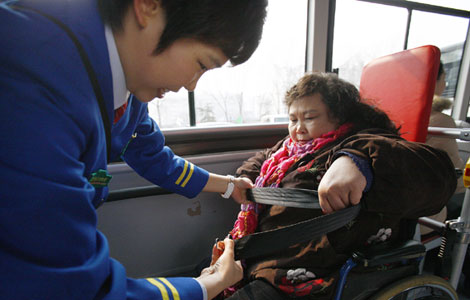Charities open to religious groups
Updated: 2012-03-01 07:34
By Li Yao and He Dan (China Daily)
|
|||||||||||
BEIJING - Chinese authorities have given the green light for religious groups to engage in more charitable work, according to an announcement by the State Administration for Religious Affairs and five other departments.
Preferential policies, including government subsidies and tax reductions, are in place when religious groups seek registration to establish foundations, nursing homes and hospitals, the notice said.
Tariff waivers and reductions are allowed when faith-based charitable groups receive donations from outside China and use them directly for charitable causes such as poverty alleviation.
Under the principles of "active support, equal treatment and lawful administration", the new regulation encourages active involvement from religious organizations in disaster and poverty relief, care of the disabled, seniors and children, providing education opportunities and medical care, environmental protection and public facility construction.
The regulation stipulates that faith-based charities should strictly function as non-profit organizations and guarantee financial transparency with regular disclosure of donors and expenditures.
Qiu Zhonghui, secretary-general of the Amity Foundation, created in 1985 on the initiative of Chinese Christians, said the new policy has leveled the playground for religious organizations and other social groups.
"Now the door is open. Faith-based charity groups should train more competent people and improve organizational management," Qiu said.
Many peer groups in China's religious circles have financial resources but lack experience to train qualified workers and set up an independent entity to run charitable projects.
"Faith does not guarantee that foundations affiliated to religious groups will be problem-free. They are subject to common challenges, such as running into debts and credibility deficits, and poor performance and outcome," he said.
"Capacity-building and human resources training are more helpful tools than directly giving money to these groups at this stage," Qiu said.
Li Haibin, deputy director of the Beijing liaison office of Donglin Charitable Society, created by Buddhists in Jiujiang, Jiangxi province, also welcomed the authorities' encouragement.
Now with offices in major cities including Beijing, Shanghai, Guangzhou, Xi'an and Nanjing, Li said the organization has gained experience to offer care for seniors and has an important role to play given China's rapidly aging population.
Wang Zhenyao, dean of One Foundation Philanthropy Research Institute at Beijing Normal University, said the new notice removed the policy barriers and sent clear incentives to motivate faith-based groups to participate in charitable activities, Wang said.
Deng Guosheng, an associate professor from the Center for Innovation and Social Responsibility at Tsinghua University, said almost all religious groups worldwide believe in universal philanthropic values, such as donating to people in need and serving society.
"Engaging faith-based groups to provide more social services is innovative in social development, and they have several advantages, such as reputed credibility and access to a large pool of followers," Deng said.
Hot Topics
Wu Ying, iPad, Jeremy Lin, Valentine's Day, Real Name, Whitney Houston, Syria,Iranian issue, Sanyan tourism, Giving birth in Hong Kong, Cadmium spill, housing policy
Editor's Picks

|

|

|

|

|

|







